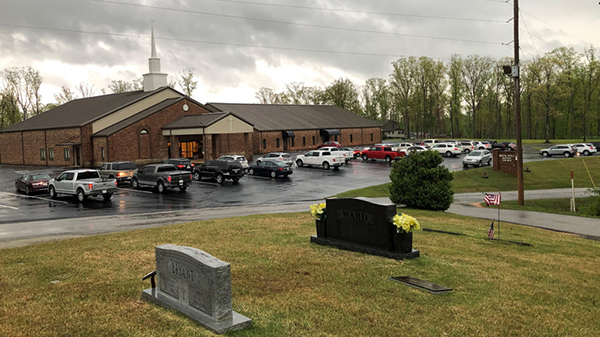For the second time since the COVID-19 pandemic began, Rock Hill Baptist Church in rural west Tennessee was resuming onsite worship. Then, Pastor Richard Bray was exposed to the virus and the church had to transition once again to remote worship while Bray waited weeks for his test results.
Bray became a one-man worship service team – preaching, leading music with his guitar, recording the service on his phone, handling the sound equipment, broadcasting the service via an FM transmitter to worshipers who listened in their cars in the parking lot, and uploading videos to YouTube, Facebook and the church website after service ended. That was his routine from mid-July to mid-September.
“I think I was tired, just physically and mentally,” Bray said months later. “Tired of dealing with all the issues, the stress of COVID, the stress of trying to do the right thing, the stress of the church members who see things differently than you do. It does take its toll.”
Joe Wright addresses the struggles of many pastors as executive director of the Bivocational and Small Church Leadership Network designed to serve about 83 percent of Southern Baptist churches.
‘Landscape is changing’
“We are hearing, just across the nation, of pastors and churches both struggling,” Wright said. “We’re seeing just the stress of trying to do ministry in this kind of environment is taking a toll on pastors and church leaders.
“There are a number of issues that we have identified, one is decision fatigue. What is happening is that the landscape is changing so quickly that from the time a decision is made early in the week, oftentimes they’ve had to make changes to those decisions before the week is over.”
Bray ultimately tested negative for COVID-19, but he had to isolate an additional two weeks while his wife exhibited COVID-19 symptoms.
“And since I didn’t have any symptoms, I really didn’t think I had COVID. But you just want to be safe rather than sorry,” Bray said. “I’ve been trying to protect our church family as much as possible. We’ve been taking steps to do that. I’ve been working very closely with the deacon body to make decisions.”
At 61, Bray said he doesn’t have as much energy as he had even 10 years ago.
‘Differences of opinion’
“And it’s been stressful, just, because there’s differences of opinion about what needs to be done,” Bray said. “We’ve got people in our church that don’t think you ought to wear a mask, and people that say ‘If you don’t wear a mask I’m not coming.’ You’ve just got both ends of the spectrum. So probably the most difficult thing is trying to steer through the middle of this path without hurting people’s feelings.”
Churches have transitioned through a seesaw of onsite and remote worship in response to fluctuating COVID-19 infection rates within communities and among congregations, with decisions adhering to leadership protocol that varies widely among congregations.
“We’re also seeing ministerial frustration,” Wright said. “There’s a tremendous amount of emotion that is being exhibited within the church right now, and a lot of that emotion is negative. … Frustration also leads to anger, leads to discord, and of course Satan also utilizes those things to create sin within the church.”
Pastors need a break, Wright said, as many are working longer hours that they worked before the pandemic. He has not heard of any small church and bivocational pastors leaving the ministry because of the pandemic, but said, “There is no doubt that many churches, because of the stress of the situation, are finding themselves in positions where they’re terminating pastors, oftentimes unexpectedly.”
Pastors are stressed by the limitations that are necessary to prevent the spread of the coronavirus. Pastors miss the feedback that church members typically offer when worshiping in person. Pastors miss the fellowship, handshaking, greeting members and guests at the altar. Hospital visits, weddings, funerals and a host of other pastoral duties are on hold.
Bray recalls when a member of Rock Hill died in the hospital of an illness not related to COVID-19. But because the hospital is only allowing staff chaplains to minister to patients during the pandemic, Bray couldn’t visit before the member died.
“The chaplains do a great job,” Bray said. “But when people are sick and they’re at the point of death, they want their pastor. … They want their own pastor to come and pray with them – somebody they know, somebody that knows them, somebody that’s loved on them before, and they know and love on them now.
“That kind of thing for me has been really difficult, not being able to minister to people, not being able to go in and lay hands on people and pray for them.”
Bray has persevered by praying, relying on the Lord’s faithfulness and seeking the counsel of friends, including Wright.
The Bivocational and Small Church Leadership Network has increased its online outreach and resources to help pastors cope during the pandemic, offering free Zoom meetings and conferences, and encouraging state conventions to reach out to pastors and churches within their reach. As early as March, the network will launch “Small Church America!” a monthly webinar of free resources for leadership and especially pastors of smaller attendance churches across the nation.
Congregations should continually encourage their pastors, Wright said.
“We feel like that the best thing you can do for a pastor right now is to call him and just encourage him,” Wright said. “It’s the absolute best thing you can do for a pastor. It’s just to call him up and say, ‘I know this a hard time for you. I know you’re struggling, but I want you to know I’m praying for you as a leader, and I appreciate you.’”
Reprinted from Baptist Press (www.baptistpress.com), news service of the Southern Baptist Convention.






Share with others: